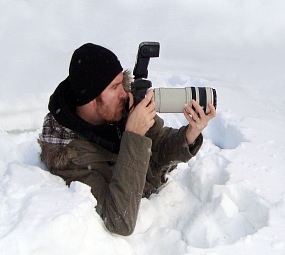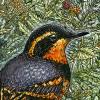

Join BirdNote tomorrow, November 30th!
Illustrator David Sibley and actor H. Jon Benjamin will face off in the bird illustration battle of the century during BirdNote's Year-end Celebration and Auction!
September 2007 - The last 40 years have witnessed the dramatic decline of many common American birds, including Boreal Chickadees, like this one. New York Times essayist Verlyn Klinkenborg writes, "...we seem determined to discover whether we can live alone on earth. Harvard biologist, E.O. Wilson, has argued ... that we cannot, that who we are depends as much on the...diversity of the biological life around us as on any inherent quality in our genes." Learn more about birds in decline at Audubon.org.
BirdNote®
Living Alone on Earth II
Written by Todd Peterson
This is BirdNote.
[Calls of Northern Bobwhite and keep it running for awhile.]
In just half a lifetime, we’ve witnessed a dramatic decline in a number of common American birds. For example, the population of Northern Bobwhite quail has fallen close to 80%—that’s 25 and a half million birds. The Audubon Society reports similar drastic declines in Evening Grosbeaks [Evening Grosbeak song], Northern Pintails [Northern Pintail whistle], and Boreal Chickadees [Boreal Chickadee call]. There are only one quarter of the Eastern Meadowlarks that there were four decades ago.
[Song of the Eastern Meadowlark]
These losses are not confined to the East Coast. On Washington’s Puget Sound the number of wintering Scoters has dropped by almost 70% in little more than a decade.
[White winged Scoter calls, water background]
In a New York Times essay, Verlyn Klinkenborg writes, “In our everyday economic behavior, we seem determined to discover whether we can live alone on earth. [Medley of Eastern Meadowlark and Bobwhite] (The eminent Harvard biologist) E.O. Wilson has argued eloquently and persuasively that we cannot, that who we are depends as much on the richness and diversity of the biological life around us as it does on any inherent quality in our genes.” [continue medley]
We need these sounds, and their makers, in our world.
For BirdNote, I’m Frank Corrado.
###
Bird audio provided by The Macaulay Library at the Cornell Lab of Ornithology, Ithaca, New York. Evening Grosbeak call recorded by T.G. Sander. Eastern Meadowlark song R.S. Little. Northern Pintail calls by W.W.H. Gunn. Boreal Chickadee calls recorded by G. Vyn.
Nothern Bobwhite and White-winged Scoter recorded and provided by M. Stewart, Naturesound.org
Producer: John Kessler
Executive Producer: Chris Peterson
© 2007 Tune In to Nature.org decline-08-2008-09-25- (Was decline-07-2008-09-25-) Redone 5-08
ID#091407aloneKPLU
Verlyn Klinkenborg, “Millions of Missing Birds, Vanishing in Plain Sight”, The New York Times, June 19, 2007. P. A22.









